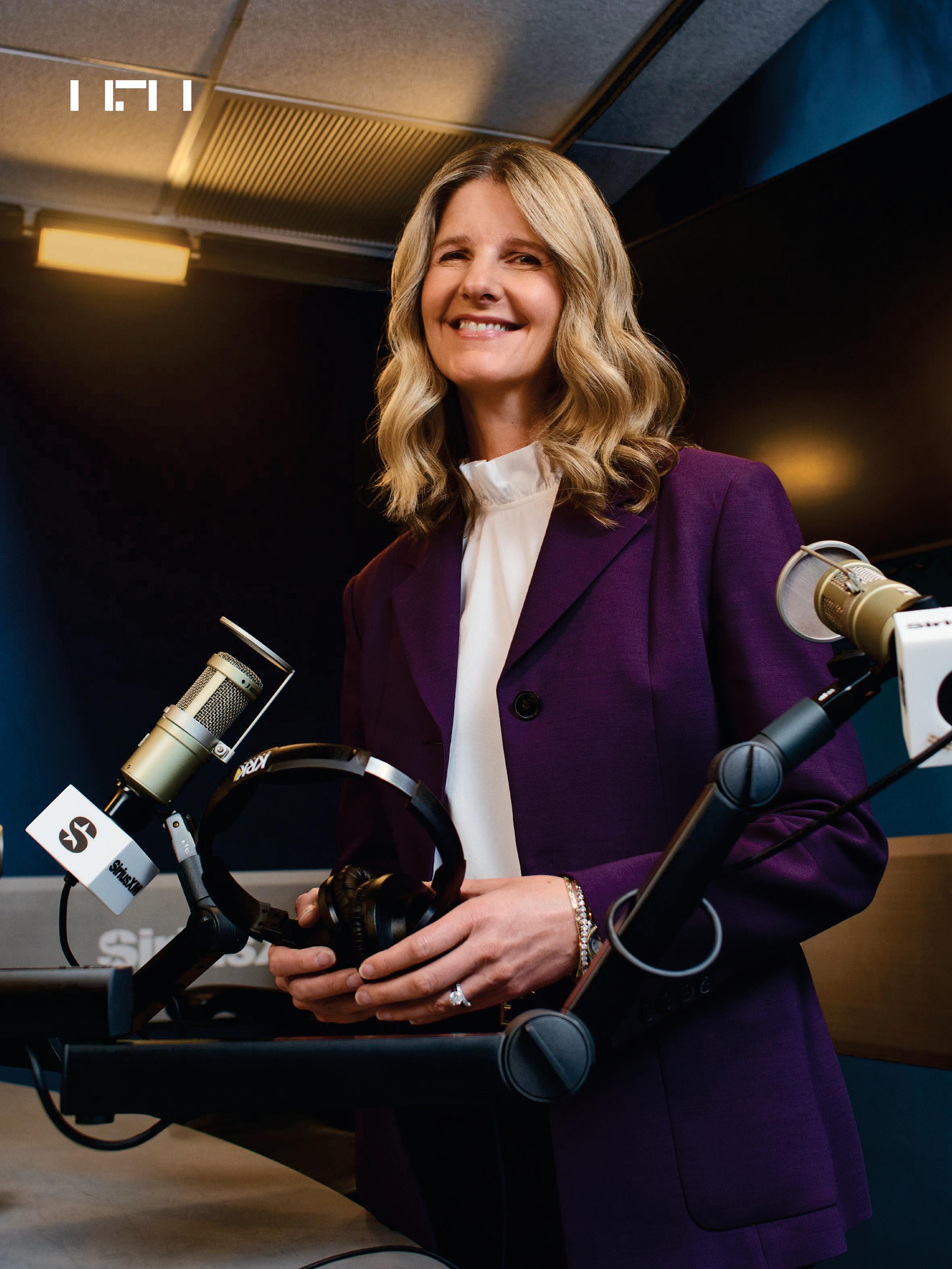Try GOLD - Free
ANYBODY LISTENING?
Fortune US
|June - July 2025
SiriusXM launched its first satellite in 2000, with the sci-fi promise of music and talk beamed to your car from space. But the newly independent company and CEO Jennifer Witz now face a very different landscape.

IN HER HIGH-RISE OFFICE at SiriusXM’s Midtown Manhattan headquarters, CEO Jennifer Witz keeps a four-foot-by-three-foot collage of concert tickets—featuring the $10.50 stub from her first-ever show, a 1982 performance by Hall and Oates, as well as tickets to a 1993 Simon and Garfunkel show, Metallica’s 2000 spectacle at Giants Stadium, and a 2010 Paul McCartney concert to celebrate SiriusXM reaching 20 million subscribers.
Music was what drew Witz in 2002 to a position in finance at Sirius, the then-new satellite radio company. Her first job had been in banking, working for garbage and hazardous-waste clients. “I decided I had to find my way in to be around music,” Witz says. More than two decades later, Witz, 56, became the CEO of a sprawling audio entertainment business, one that includes music, yes, but also news, sports, podcasts, and an advertising business. She also must navigate some areas even further from the music world—like the impact of new-car sales, road safety regulations, and satellite launches into space.
SiriusXM—originally designed to be a techy upgrade to car radio listening, without the commercials and service gaps—is now an $8.7-billion-in-revenue Fortune 500 company for the first time, after spinning off from Liberty Media in late 2024. Yet despite its status as a home for some of the most popular entertainers in America and a remarkably healthy, high-free-cash-flow business model admired by the likes of 35% shareholder Berkshire Hathaway, it stares down several existential risks: competition from on-demand streaming audio; a declining and aging subscriber base; and, years beyond that, a world where its core domain—the car—is self-driving, a place for passengers to not just listen to audio but watch its competitors, TV and video.
This story is from the June - July 2025 edition of Fortune US.
Subscribe to Magzter GOLD to access thousands of curated premium stories, and 10,000+ magazines and newspapers.
Already a subscriber? Sign In
MORE STORIES FROM Fortune US

Fortune US
MCKINSEY ALUMS DOMINATE THE WORLD'S C-SUITES. WILL AI DRY UP THE FIRM’S CEO PIPELINE?
THE CONSULTING GIANT HAS PRODUCED MORE FORTUNE 500 CEOs THAN ANY OTHER INSTITUTION. NOW IT'S SPRINTING TO RETHINK HOW IT TRAINS LEADERS.
15 mins
October - November 2025

Fortune US
WANNA BET? WHY INVESTORS ARE GAMBLING ON KALSHI AND POLYMARKET
THE 2024 ELECTIONS SHOWED THE POTENTIAL AND POPULARITY OF “PREDICTION MARKETS.” BUT THE STARTUPS AND THEIR HEADSTRONG YOUNG FOUNDERS STILL FACE LONG ODDS.
13 mins
October - November 2025

Fortune US
RESTORING THE AURA OF RALPH LAUREN
A DECADE AGO, RALPH LAUREN THE COMPANY WAS JEOPARDIZING ITS LUXURY REPUTATION AND WATCHING PROFITS PLUMMET. THE SOLUTION: FINDING THE RIGHT PARTNER FOR RALPH LAUREN, THE MAN. HOW PATRICE LOUVET HELPED AMERICA’S MOST IMPORTANT FASHION COMPANY GET ITS GROOVE BACK.
13 mins
October - November 2025

Fortune US
RAMP WANTS TO SHAKE UP CORPORATE CREDIT CARDS. INVESTORS BELIEVE THAT'S A $22.5 BILLION IDEA
The fintech startup is aspiring to change the way companies spend—and taking aim at American Express. But can Ramp live up to the hype?
13 mins
October - November 2025

Fortune US
PASSIONS: BE OUR (ONLY) GUEST
AFTER THE MANGOSTEEN daiquiri misted tableside with lime oil, the cheesy garlic naan, the broccoli salad with pistachios and mint, the pink peppered pineapple soda, the tandoori half-chicken with tingling green chutney, the crock of thick, savory, buttery black dal—after all that, served in the celadon-green Permit Room in Notting Hill, no, I did not need dessert.
3 mins
October - November 2025

Fortune US
THE BATTLE TO SAVE INTEL
BUOYED BY EMERGENCY INVESTMENTS FROM THE U.S. GOVERNMENT AND INDUSTRY PEERS, ONE OF AMERICAʼS GREATEST TECH COMPANIES IS IN THE FIGHT OF ITS LIFE.
10 mins
October - November 2025

Fortune US
THE FUTURE 50: FAST-GROWING COMPANIES THAT INVESTORS SHOULD WATCH—AND LEADERS SHOULD EMULATE
BUSINESSES WORLDWIDE have weathered a chaotic year so far in 2025. Shifting global trade and tariff dynamics and the AI race have made the pace of change even more relentless than usual. Costs have risen, and bankruptcies are up. Still, across sectors, some companies are not just staying afloat, but thriving—and in many markets, buoyant share prices show that investors retain their optimism.
4 mins
October - November 2025

Fortune US
FEAR ON THE FARM
BIG AGRICULTURE WRESTLES WITH THE WHITE HOUSE IMMIGRATION CRACKDOWN.
10 mins
October - November 2025

Fortune US
TECH: THE AI OF THE HURRICANE
WHEN NASA and its Soviet rivals launched the first meteorological satellites into space in the 1960s, weather forecasts on Earth changed forever. With a constellation of eyes in the sky, forecasters could suddenly monitor conditions over oceans and remote landmasses, filling in major gaps in their models and providing an early warning system about potential storms forming far away.
4 mins
October - November 2025

Fortune US
WHEN THE MACHINES CAME FOR AMERICAN JOBS
“FARM MECHANIZATION HAS JUST BEGUN,” proclaimed the cover of Fortune's October 1948 edition. And indeed, the rise of machines such as the tractor was causing profound changes in the American workforce, the accompanying article explained: “In 1800 three out of four in the working population were in agriculture... In 1948 only one in seven U.S. workers is needed to provide the nation’s food.” That trend continued: In 2003, Fortune reported that the agricultural workforce made up just 2% of employment—yet farms still produced a more-than-adequate bounty for American consumption and export.
1 min
October - November 2025
Listen
Translate
Change font size

